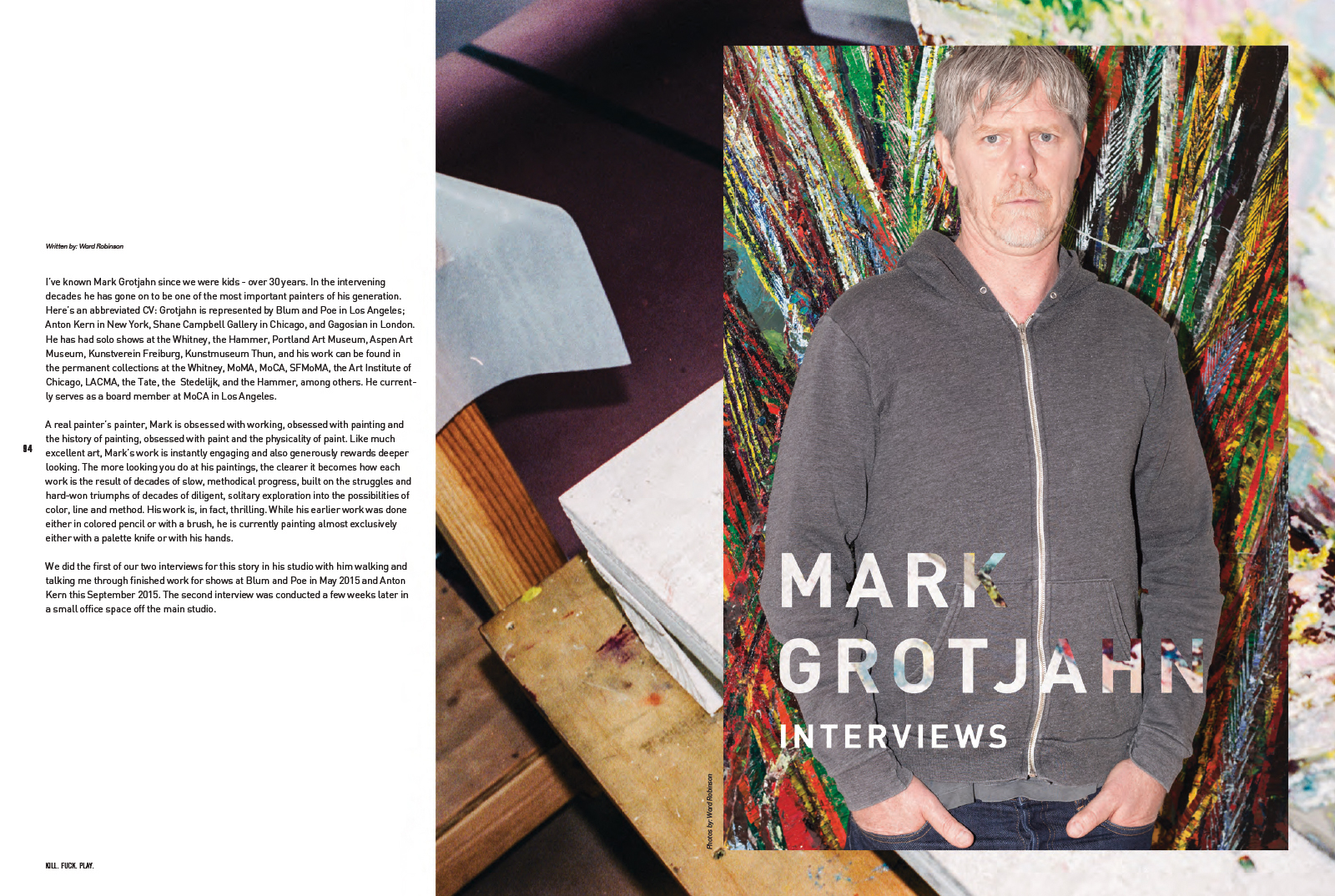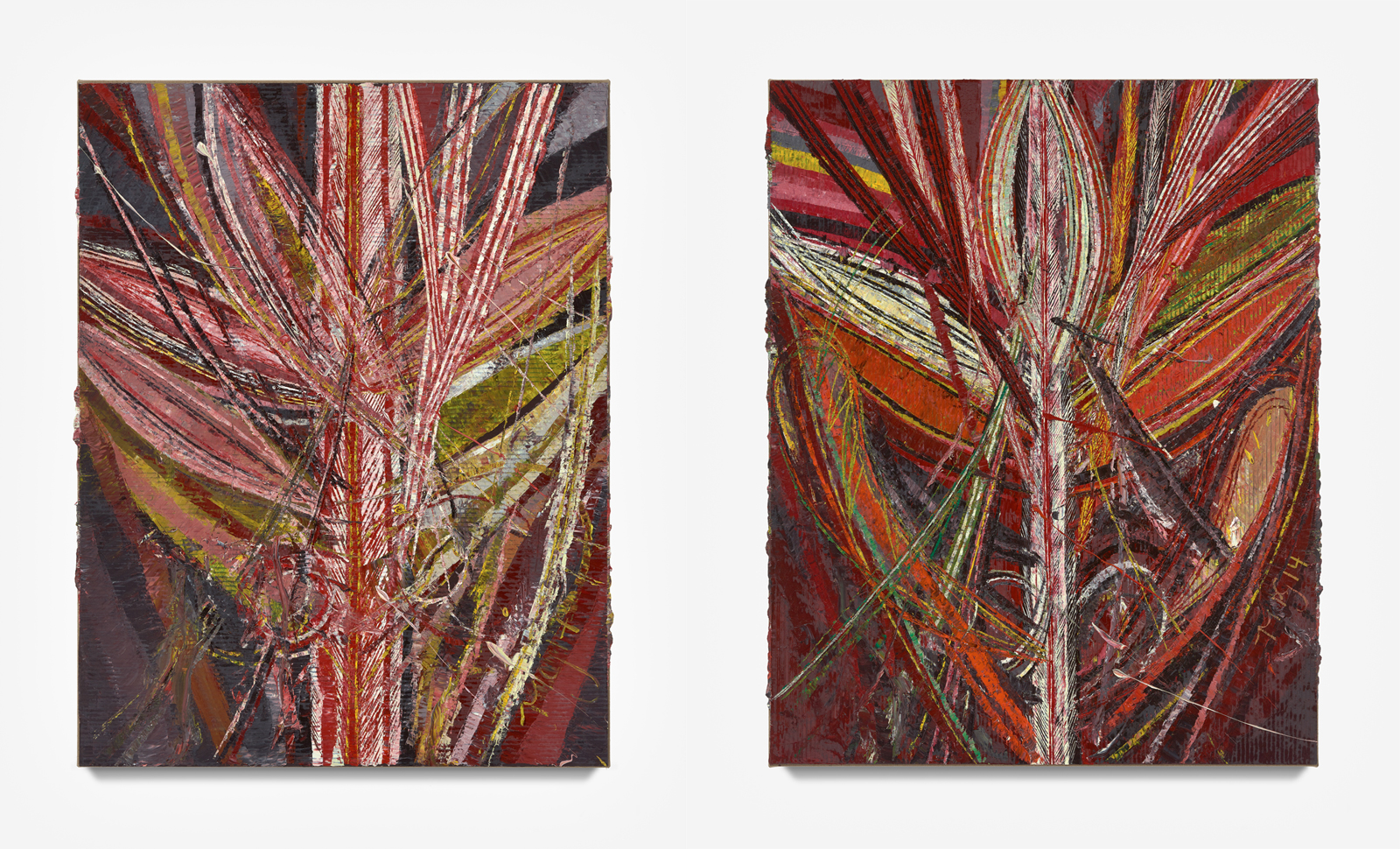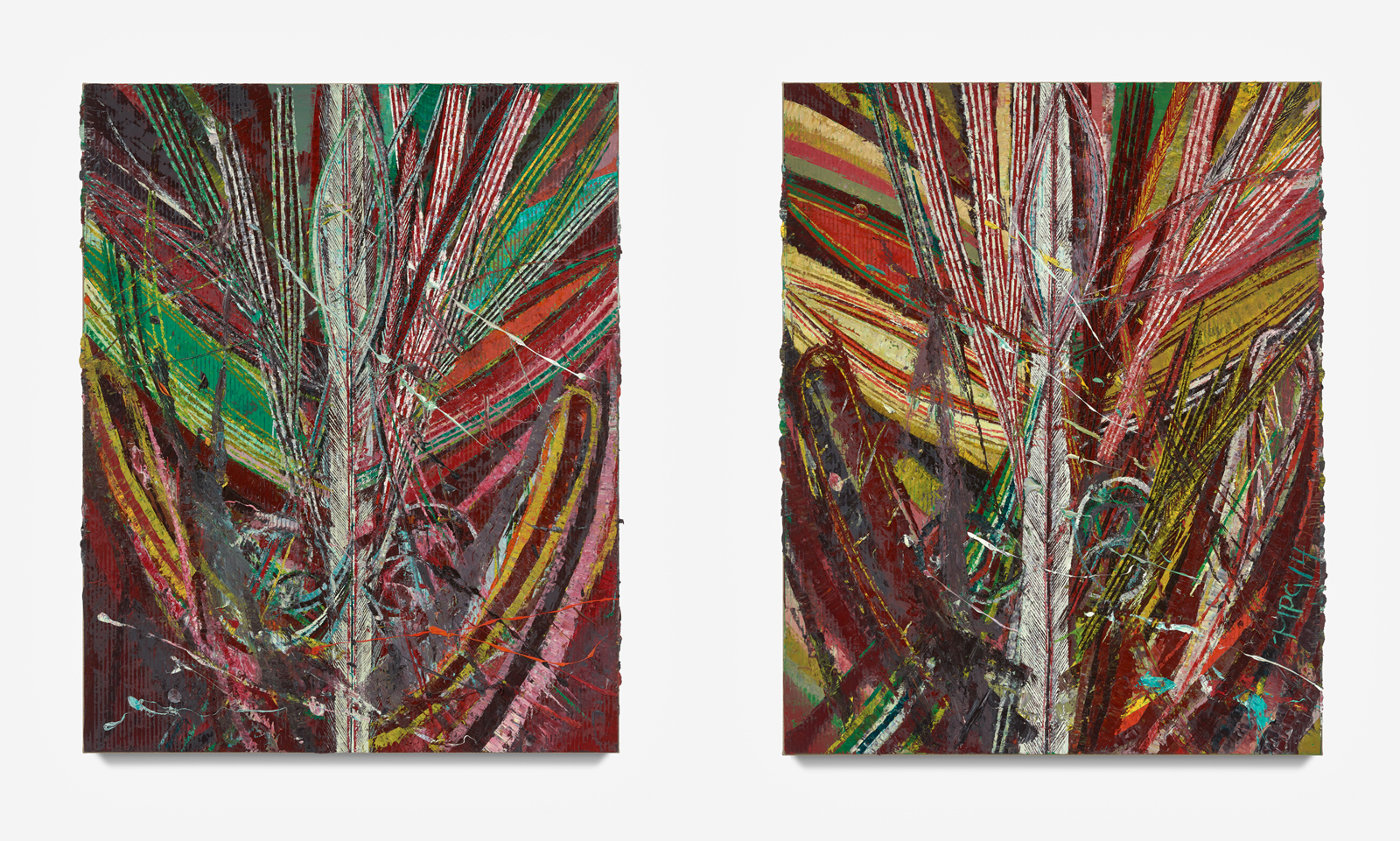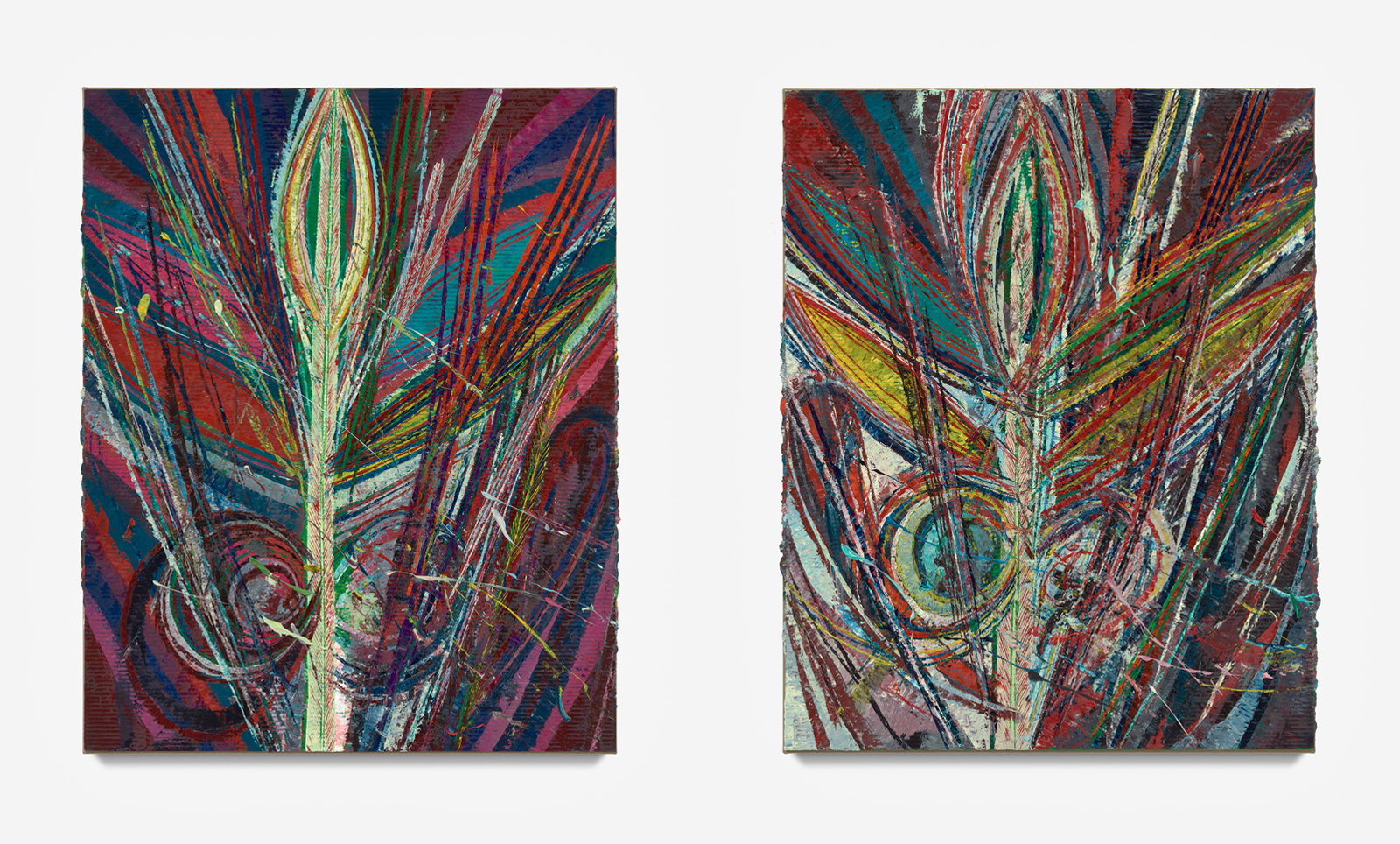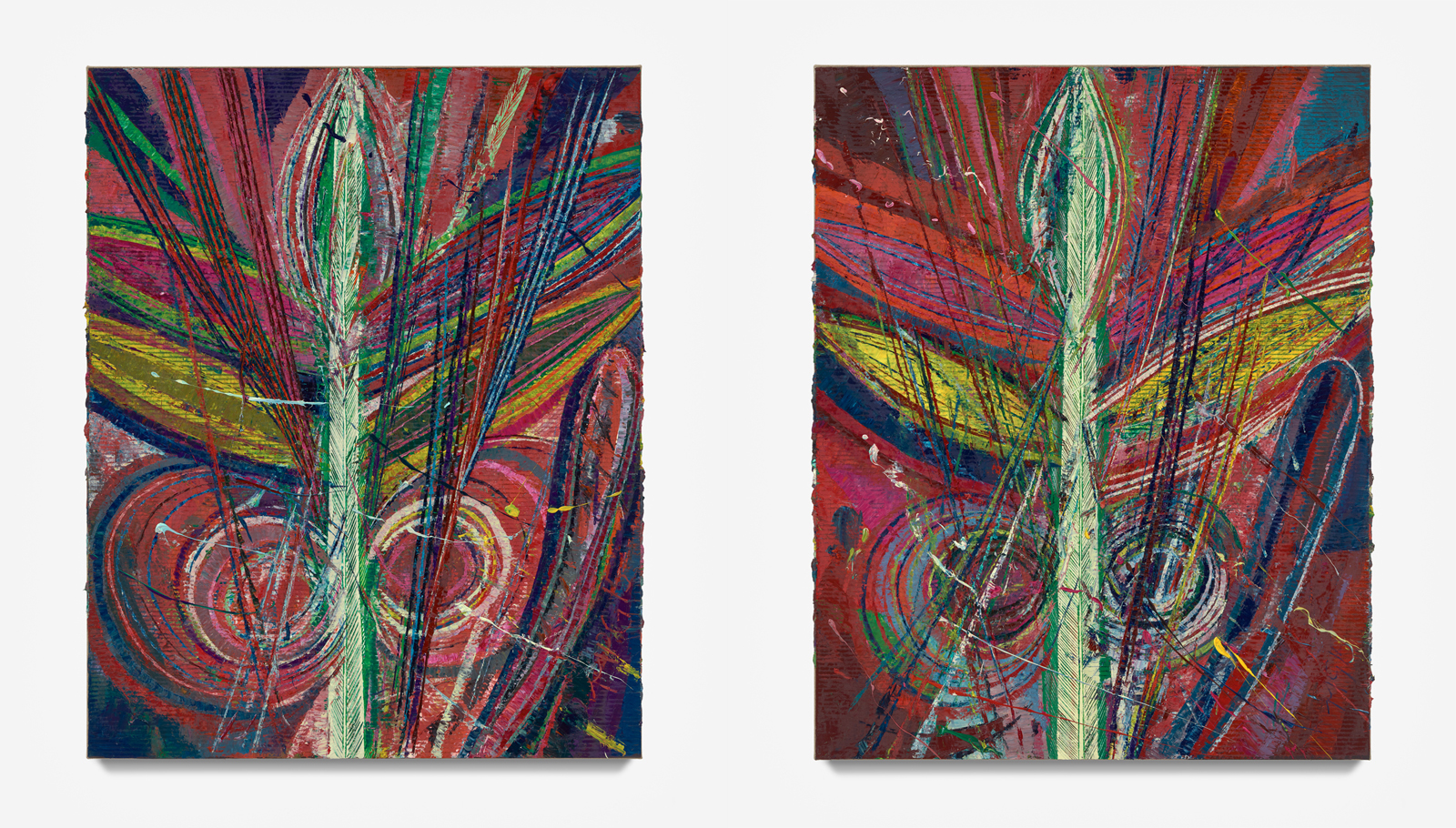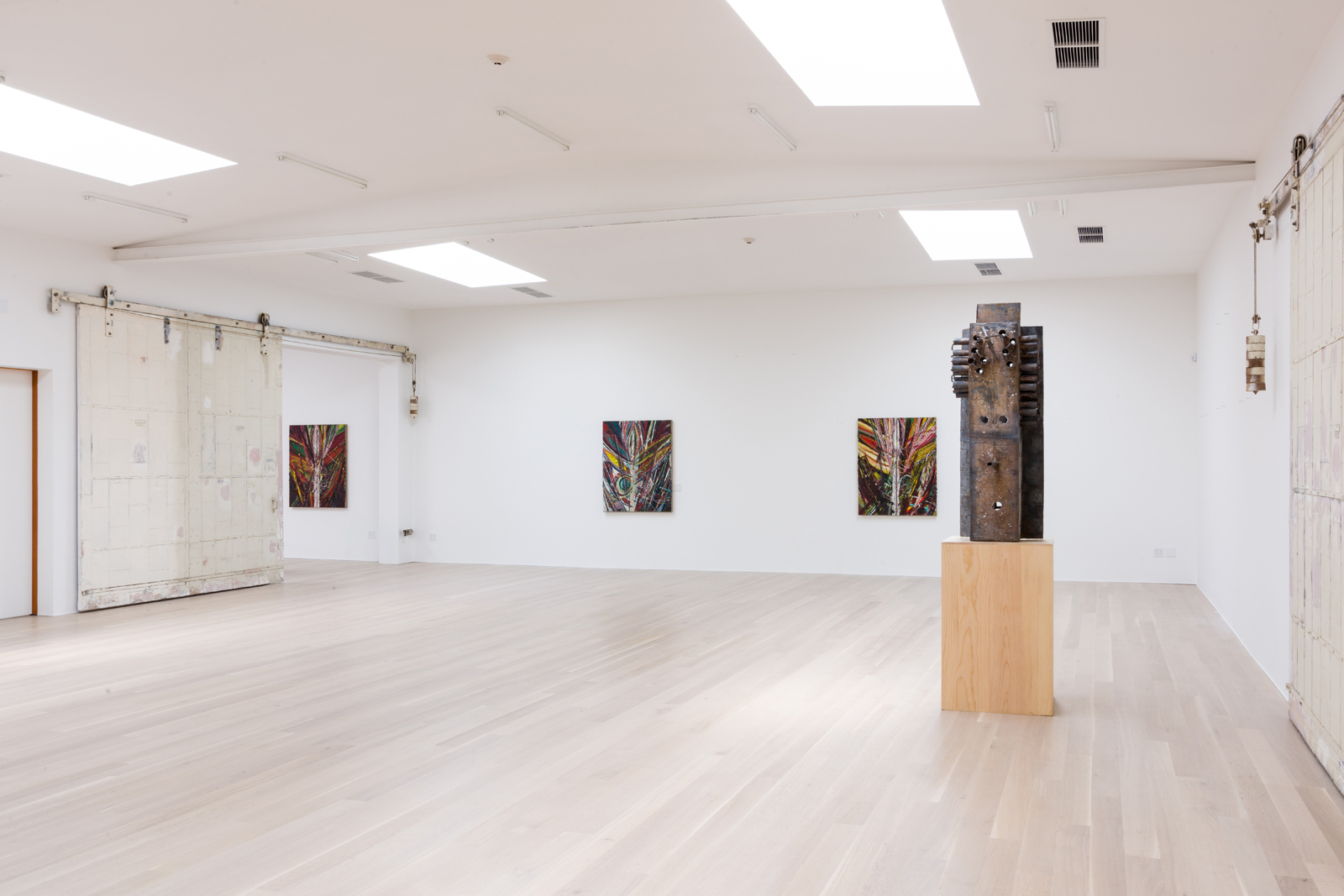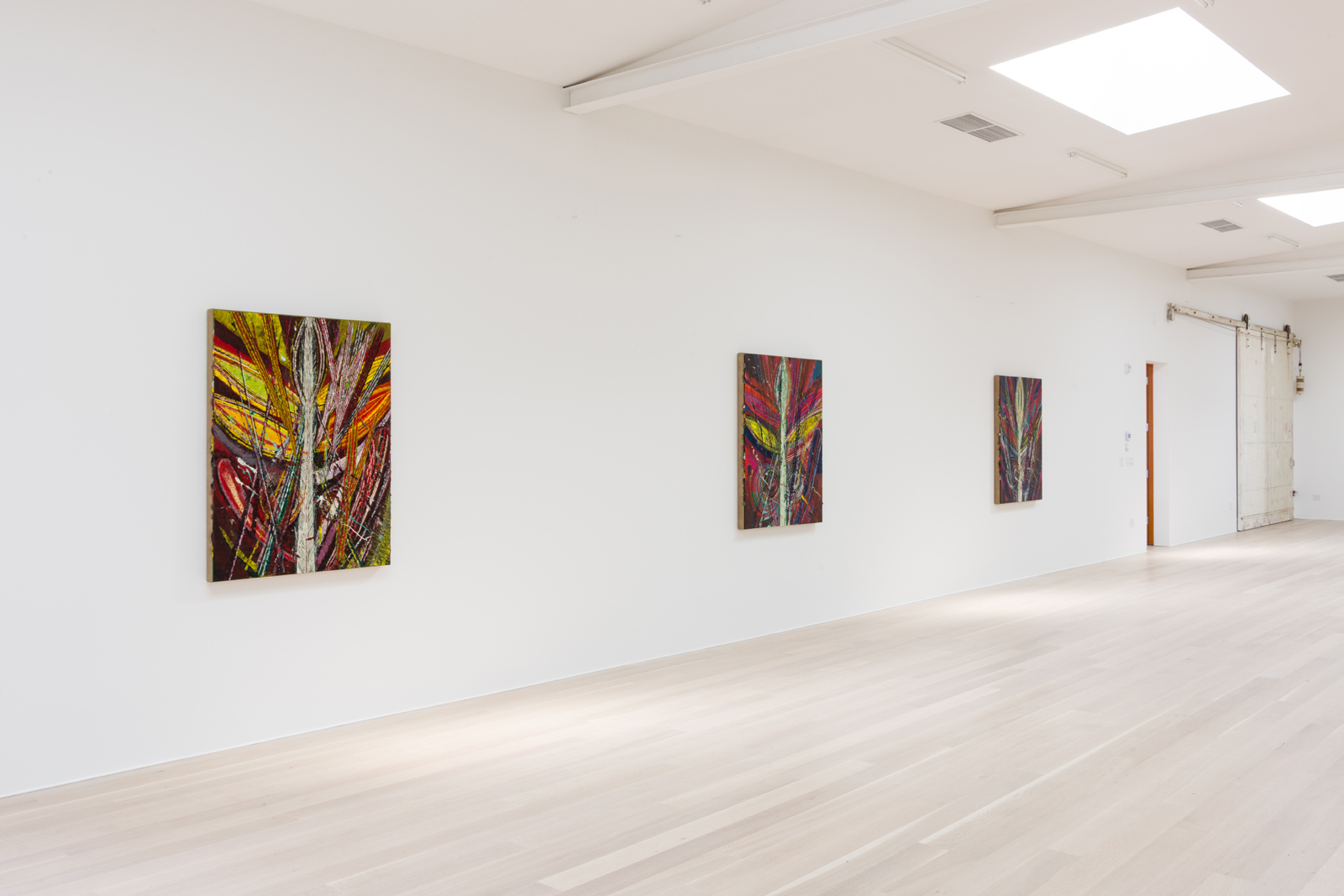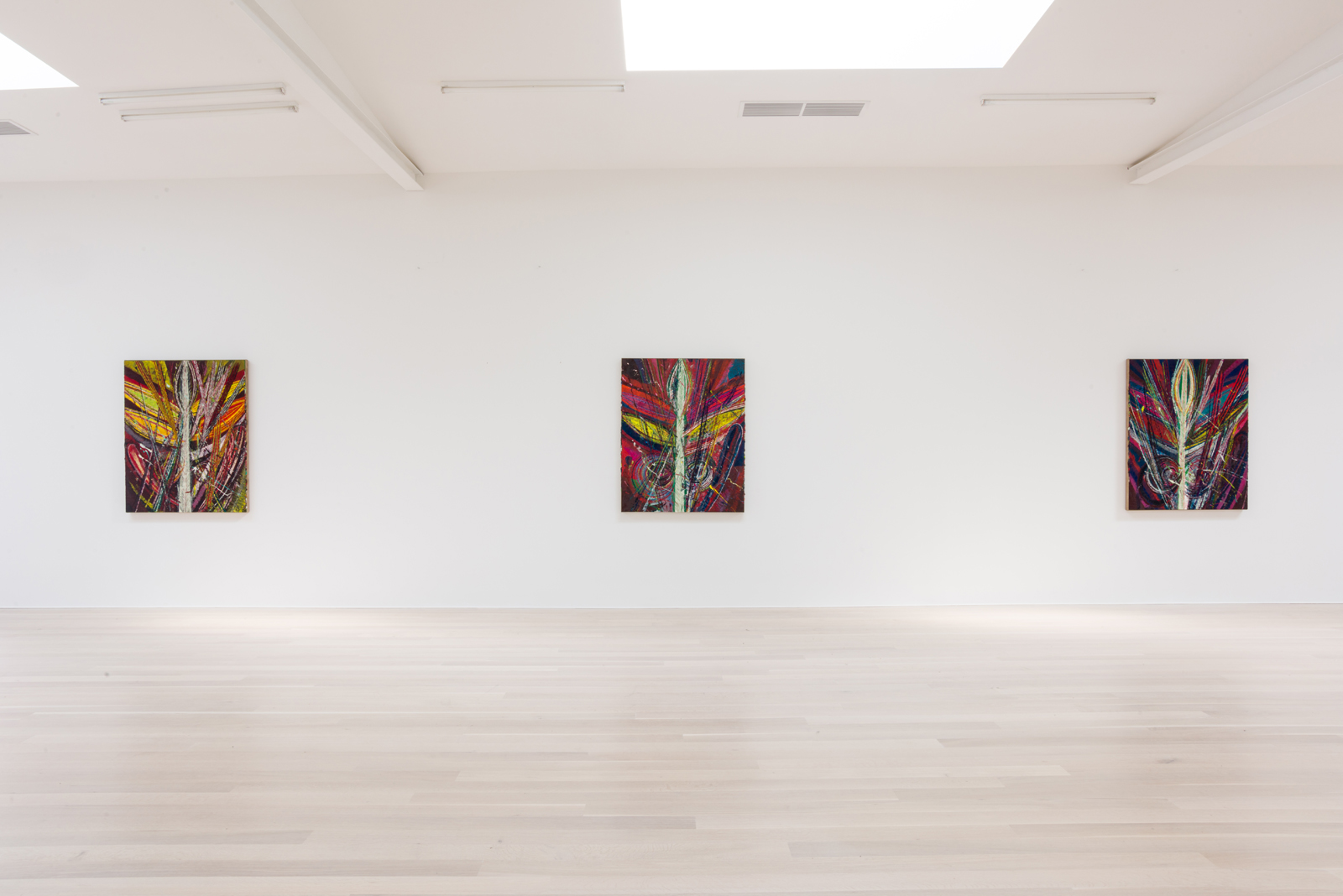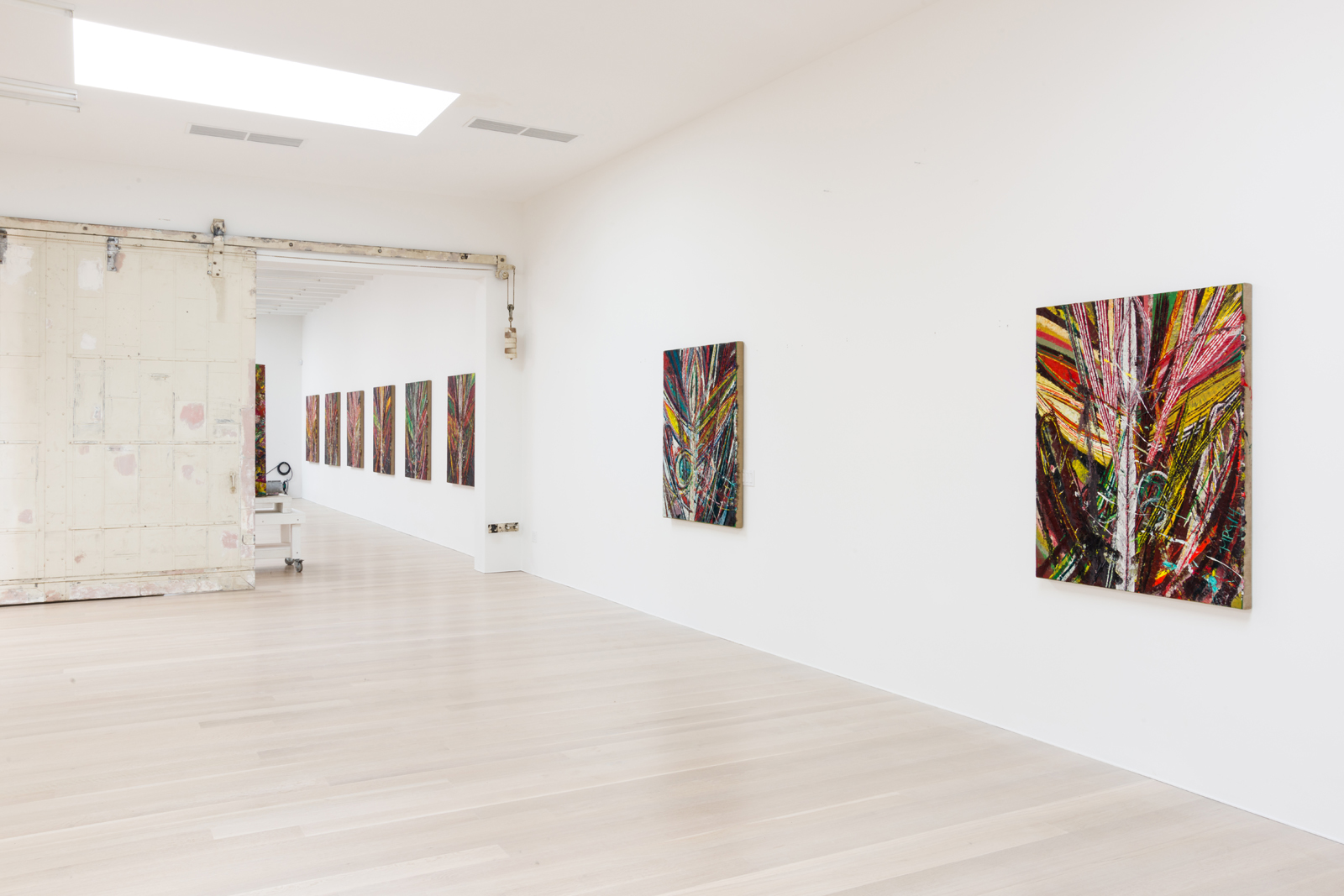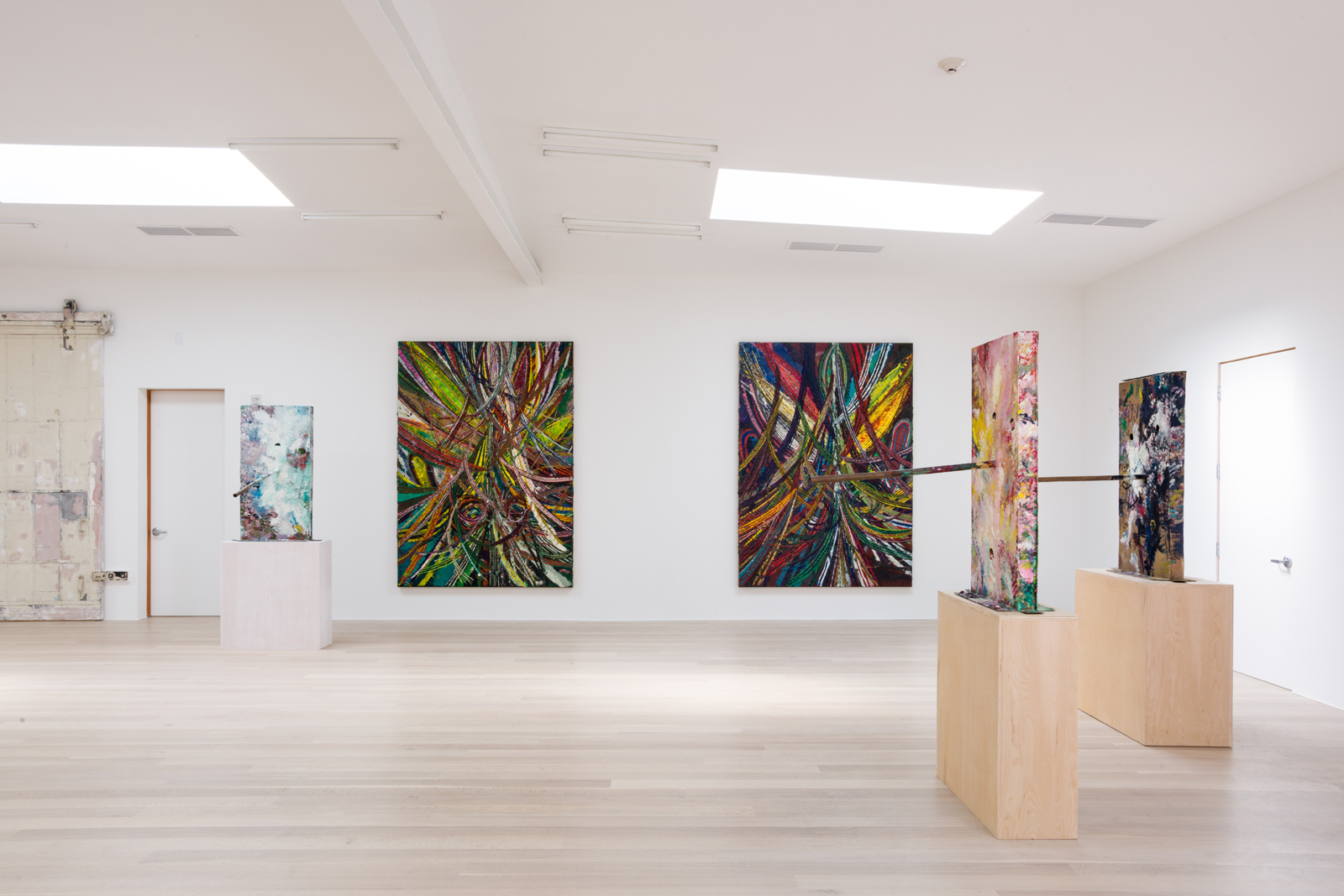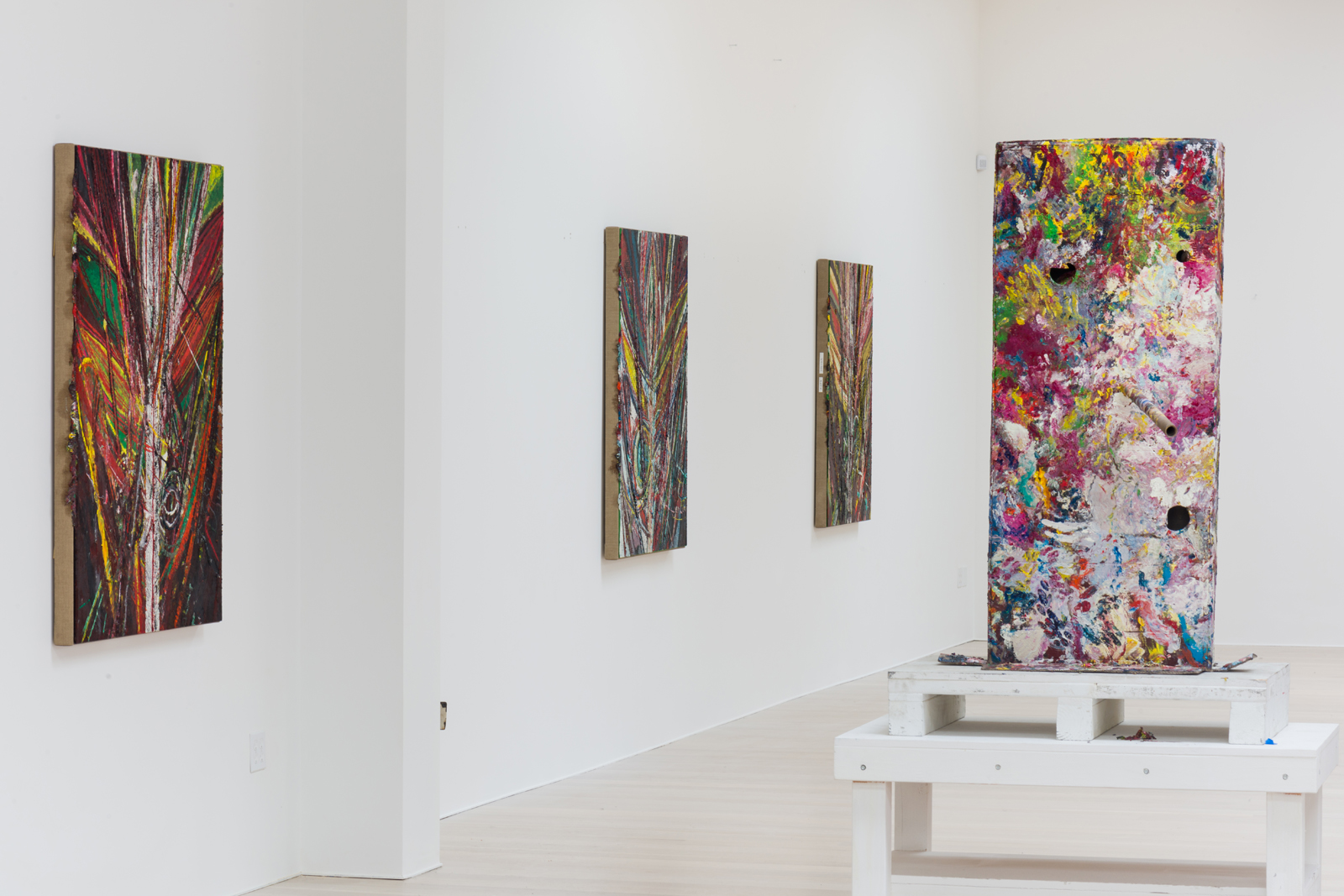THE MARK GROTJAHN INTERVIEWS
By Ward Robinson
Photos by Ward Robinson, Douglas M Parker Studio, Ruben Diaz
This story originally appeared in ISSUE 1. Click here to buy the print edition
I've known Mark Grothjahn since we were kids, for over 30 years. In the intervening decades he has gone on to be one of the most important painters of his generation. An abbreviated CV: Mark is represented by Blum and Poe in LA, Anton Kern in NY, Shane Campbell Gallery in Chicago, and Gagosian in London. He has had solo shows at the Whitney, Hammer and Portland Art Museums, is in permanent collections at the Whitney, MoMA, MoCA, SFMoMA, LACMA and Hammer among others. He currently serves as member on the board at MoCA.
A real painter's painter, Mark is obsessed with working, obsessed with painting and the history of painting, obsessed with paint and the physicality of paint. Like much excellent art, Mark's work is instantly engaging and also generously rewards deeper looking. The more looking you do at his paintings, the clearer it becomes how each work is the result of decades of slow, methodical progress, built on the struggles and hard-won triumphs of decades of diligent, solitary exploration into the possibilities of color, line and method. His work is, in fact, thrilling. While his earlier work was done either in colored pencil or with a brush, he is currently painting almost exclusively either with a palette knife or with his hands.
We did the first of our two interviews for this story in his studio. Mark was sipping a Pepsi, walking and talking me through his studio layout. The studio contained finished work for two shows, work in progress for those same two shows, and an area for experimenting with paint and painting. The second interview was in a small office space off of the main studio.
INTERVIEW 1
MARK: I am the best palette knife painter in the world! [Laughs]. These here are the 'Indians', and they're basically setting up a motif and exploiting that motif within certain parameters. This was the first one [addressing first of the series], so it sets up this feather, I mean here it kind of looks like a snakeskin, and then I have broken it up with an eye. And then with the second one here [gestures at the painting hanging next to the first], it gets even more broken up. I don't remember what the third one was...[Finds the one he is looking for down the wall a bit] It was this one here with the scraping away. After this most of them had a green underbelly. They're all painted on cardboard. I used to carve into them.
[Addressing the most recent 'Indian']: This one is just really pretty with its purples and pinks. You see some of this palette in the sculptures, and it just feels like Vienna in the 20s, somehow. I want it to be decadent. Right now I want all the paintings to be decadent, and have pattern, and color, and all that. I just want to dive in.
Animals: Where does the desire for what you want out of the painting come from? Do you normally have that?
Not normally but I like it when I can know the vibe and I can hold onto that long enough and I can actually see that vibe happening. I like it when things are going well. That's when I like to paint. I like it when I'm in the zone, it just takes a while to get there. Michael Jordan used to talk about being in the zone and he could see himself as a preying mantis with a little ball and a huge net. I like it when I have that. I get that sometimes.
Does this newest one have that feeling?
I don't know if it's the Pepsi or what, but I feel like I got some of that feeling in there. I got some of this purple and green and...I have done very little work today, and I feel pretty good about it. I started this series with the idea of those colors that I think of as 20s Vienna. After I was doing this Vienna vibe for a while I started looking online at Gustav Klimt, whose work I never liked. I mean, I liked the fact he was in a Moroccan kaftan with models, I like that orgy free sex and art, but I did not like his art. As it turns out now I really like it.
But no gold leaf in yours?
It seems like there could be gold leaf in that. I mean is there a way that I could do that? Is there a way that I could do gold leaf? It'd be so insane if I could pull that off. But I'm really excited by the color, and the possibility of color. How else do you spend thousand of hour after thousand of hour, unless you're fucking obsessed about something in the process that you're doing? That was my Wheaties commercial.
Do you paint for the show?
This body of work is painted for the show and the vibe I want to get across.
And you paint for the space?
I paint for the space, and the vibe I want to get across. You might want a different vibe for a different space. This work is what I want to do now here. Initially I wanted to do just five big paintings in one room, they have three rooms, and leave the other rooms blank. So I started these big paintings, and I was going, and I don't know why but they didn't work. They didn't work, so I scraped them, and they suck. Going through periods where it goes bad, where I feel like I don't know what to do, where I feel like it's controlling me and I'm being a pussy, is part of the deal. But still, having said that, it still affects me on an emotional level.
I started doing some small ones to see where that would take me, and this is where it took me, and I just went with it. We are two months before the show, and I have the ten Indians. In the past I've always been done at least six months before so for me to work until the end like this is unusual. I can't say I enjoy it. I don't like making a painting knowing that it has to be good enough to put in a show. I'd rather make too many and then edit.
I have a show with Anton Kern in September and I'm gonna show painted sculptures. I paint these with my hands. These are bronze. I make it in cardboard and I cast it so it's almost like having a blank canvas except the motif is done with the eyes and the nose and the mouth. It's predetermined. The sculptures are a fuck you in a way. They are a dick nose on a big piece of cardboard with carved out eyes, and so in a way it makes it easier in a way to do a pretty painting on top. There is a long history of bronze painting. Picasso painted on bronze Giacometti painted on bronze. And the way bronze takes oil paint is just... I just think they are so decadent.
Several years ago I started thinking a lot about Monet, after I saw a show of post-impressionists. I really like the way they painted with their little dots, and how such a small painting could hold a room. It's interesting that that is the case, because now I'm doing these small paintings. This is one is a 'French'. I call these 'French' because I was painting them like Monet. They're probably more Ab-Ex than Monet but the colors are Monet. There's a lot of Joan Mitchell in here, and stuff. But just taking the sea and the sky, and just doing a landscape like in this kind of a way....
These are so different than the paintings, it's a whole new language.
It's a new language and it's been developing and now I feel like I'm in a place to really exploit it and that opens up a lot of possibilities. And it's nice to come down here on a day that it's overcast and be talking to you and not really be working and have a chance to really look at it. That's something I don't do enough of. I'm so compulsive in nature that if I'm not working, and for me that means physically making something, then the time is wasted.
There is so much playfulness in the application of the paint. I mean, you're finger painting! It does feel like there's a lot of joy in how you made it and a lot of exploration.
There is a lot of exploration and there are moments of joy but I think they look more joyful to make than they actually were. I think there's always a lot of panic and there are moments of grace.
[Looking at the painted surface of a 'French' mask]
I can't believe how beautiful that is. I just can't believe it.
On top of everything else it is really pretty paint.
It is really pretty paint, it doesn't exist. I like that. I don't know how as a thinking person you would decide to do that kind of pretty paint, you know?
So how do you decide to paint something so pretty then?
I come out of the 90s, when Nirvana was doing their thing. They knew that smashing a guitar was a cliché, and at the same time they did it. It meant something different, and it kind of meant the same thing. So it was possible to do something, even with the deconstructed knowledge of what it meant.
While you're in the middle of working are you aware of that? The history of the things that you're working with and the hope that you'll push past it, is that conversation going on in your head?
Yeah. Yeah. There are a lot of conversations that are going on in my head. When they are of a historical nature it's usually like, "Who do you think you are, doing this? What makes you think that this is OK?" It's a very critical thing and then hopefully sometimes that disappears and I can do the work. But that would mean the question still is, "Who the do you think you are that you can do this, and do something different with it, knowing what you know?" When I put down those colors I can't believe I'm doing that.
INTERVIEW 2
Being a successful artist is its own unique place on the planet where you've bet on yourself and challenged traditional ideas and done it all on your own. So when you succeed at that, society accepts and excuses, maybe encourages, behavior that almost no other profession would be allowed to engage in without there being some kind of backlash.
Yeah. Musicians would be one of the exceptions. Politicians, not one of the exceptions.
If Peter Volkous stood up at a cafe at a museum, and pissed on the table, people would applaud.
Perhaps. Pollack peed in Peggy Guggenheim's fireplace at a party on the Upper Eastside, and that is one of the great art stories. Not giving a fuck, and doing it publicly, I always looked at it as kind of the ultimate.
How have you not given a fuck?
Well I don't know, "Not giving a fuck", and doing it publicly, is giving a fuck, right? I have given a fuck, and that's the thing you know? I want to not, so I pretend I don't. I pretend like I'm good artist, and I pretend that I'm fearless, and I put all those things together, and imagine what that person would do. And then once I figure out what that person would do, that's what I do. That's what I try to do, especially with the art.
That feels potentially like some kind of trap.
Why?
Because that could lack authenticity.
Oh but you end up becoming that thing. I mean it's moving and faking. God, it's so weird to talk about this shit. I'm interested in going into places where the outcomes are not exactly known. Wait is that true? There is how I am and how I was.
Let's start with how you were.
I made a painting, I did a lot of it on acid with my eyes closed by the pool. That work did hang in the Reagan Whitehouse, and it represented California. There were 50 works from 50 states, and I was a junior in high school, and I represented California. That was the "Just Say No" campaign. I like that story. That is actually true.
Has that method of working, being somehow altered or wasted, carried through?
No. I've made very very little work under the influence. I think I got a tremendous amount of relief knowing that at any time I could take off into my head. I think that doing psychedelics in my teens and twenties certainly affected my brain chemistry, and the way that I saw things, but I was done with that early. So no, those kind of extra-curricular activities were extra-curricular. I didn't use them. I even kept the alcohol at bay for a long long time because it interfered with the work. To me it seemed irresponsible. I didn't want to have a hangover, or anything else, get in the way of what I wanted to do.
I really wanted to have a venue in which to express myself, right? I had a place in which I could make the work, but I also needed a place where I could show the work. Galleries. Getting those venues was really important, and I saw drugs and alcohol keeping me from getting those venues, although drugs and alcohol were very effective for social situations.
It wasn't until much later that I started to get more of the things that I really knew one hundred percent would make me happy, not make me happy but allow me to operate with impunity outside of the studio, which is what I always wanted, and that didn't happen. I wasn't happy even with all those things.
When you say operate with impunity you mean permission?
I just didn't want anyone telling me what to do, you know? I wanted to do whatever I wanted to do whenever I wanted to do it however I wanted to do it, and I didn't want anybody's ideas or opinions getting in the way of that. And that is what I thought that having those venues would mean for me.
And it hasn't?
No. I thought just having one gallery where I could show my work, where I could express my ideas, would be enough. I thought if I could just have that one gallery, then I would have absolute freedom always. It's a very unrealistic way of looking at life, but I really thought that for me that was possible. I think I have a more realistic version of life now, but I think that having that, whatever it is...grandiosity, allowed me to struggle for years and years. And also, a belief it was possible to get to this place that was perfect propelled me. As well as having things that I thought were worth looking at.
Why painting as a medium?
Well I always drew. I always did designs. When I got to high school I did colored pencils and colored pens, and I had those geometric stencils. I always looked at those as designs. I was good at it, and I could lose myself in those schematics. It wasn't until I got into high school that I had a teacher who introduced me to Kandinsky and The Spiritual In Art, and who showed me that these designs could be considered art, that I understood I was making art.
So I was always drawn to the two-dimensional, and two-dimensional is pretty much painting. And then at some point, that sort of branched off into kind of conceptual performance work that existed in with other people. I did performance out in the real world, expanded on it, and then showed it in an art setting with photographs, which are two-dimensional. And then the signs that I exchanged were also two-dimensional.
I remember that show. You had the tape recorder too.
Yeah. You saw that?
Yeah.
In Berkeley? Or in San Francisco?
Must have been San Francisco.
Oh my God I should get that-did I give you that book of the liquor store signs?
No. But I saw that show, it was fucking hilarious. So your conceptual work was short lived, and then you decided to go right into painting?
I moved down to LA. I opened up a space with my friend Brent Peterson, who was at UCLA at the time, and that was back in '97. At that time, there were not enough good, young galleries for as many good artists as there were in LA. Not even close. Most of the galleries only gave solo shows to very specific artists, who went to three of the main schools here in LA, and came out with the highest recommendations from the most famous professors. That was it. Otherwise maybe you could get a group show, and a group show never showed what an artist could do. So me and my friend Brent opened up a space with the idea that we would only do solo shows, working with artists who didn't have other representation, and give them a beautiful space and an opportunity to really say something. So that's what we did, and we said that if we couldn't find enough good artists we would show our own work. Show our own work 24/7, that was our joke, and we never did. Opening up that space, and working with artists (who are really hard workers, and want nothing more than to work really hard on their stuff and talk about their stuff), that took care of a lot of my conceptual needs in terms of being a part of something larger in the way that the more social performative stuff did. Then I started looking for why I got interested in art in the first place, and I was always interested in line and color. And then I started going back in.
I always believed that art could be whatever you wanted it to be, but doing that performance work reached it on a different level, a deeper level, because it was anything. I think that going back into why I originally got interested in art was a conceptual decision. I think it was a political position, and a conceptual decision. And so then I started painting again.
What kind of painting problems are you wrestling with now?
Well, I've been doing faces strictly since 2008. Within the last few years I've been painting on these sculptures, and painting on the sculptures I am painting with my hands. The faces are really only done with palette knives. The sculptures are painted almost exclusively with my hands. So now what I'm struggling with is, is it possi...well of course it's possible. So the struggle is, how do I get this new way of painting to translate from a sculpture to a painting? So that's the biggest struggle.
I've been working on translating that off and on for a year, and I haven't made a good painting yet doing it. I'm trying to do basically finger painting on a stretcher and it's turning out terrible. But it really works well on sculptures, so it may turn out that I've figured out a really beautiful way of painting these sculptures that doesn't translate to paintings. I really want it to translate to paintings. So right now that's the biggest struggle. And it seems like in my head that it would fucking work and that's the big difference between having an idea and doing it. I've found that the idea can work in my head, I can dream about it and know that it fucking works, but then I do it and it's a completely different ballgame. And so I don't know what other experimentation needs to happen or if I throw in the towel. I don't think I throw in the towel for at least another year, but it's really frustrating to want something, and not have the skill to get it. Or the know-how.
What are those paintings about?
Well I think that's what they're about: they're about how to make gestural abstraction using my hands. How do you do that? I don't know if that's what they're about but that's what I am trying to do. Maybe I find out what they're about later. Maybe if I can fucking do the thing well, then maybe I find out what they're about. I'd like them to be a study of color and gestural abstraction but beyond that I don't know what they mean. I know I want to get a vibe, ultimately it should express a certain vibe, but I don't know what that is.
Conceptually, I like having something that I'm failing with. I like that, and that's really fucking exciting, but when I'm failing I hate it. I hate it.
Do you know what your other paintings are about? Do you know what the faces are about?
Hahahaha that's such a brutal question. I mean I could tell you the starting point. I know how I started doing them. It's really a very traditional way of painting that is traditionally considered expressive, and I wanted to have that as a wind down tool after a long day of painting really regimented, geometrical abstraction. I wanted to let go of that tightness. So that's how they started. And then when I decided that I would continue it further into paintings that would be presented as my artwork, I started getting involved in, like, Picasso eyes, which is the first thing a young artist does to say, "I'm experimental, I'm part of the Avant Garde!!" It's a real clichéd way of showing that showing that you think different, you know? And so within that language that is tackled by every 19 year old painter, I wanted to take that language and try to make something good with it. So that was the goal, I wanted to make something really good within that language.
There was that conversation you had with Schnabel in interview where he said your painting's are a response to his paintings
Sure, Schnabel is there.
Well that's not obvious to everyone, most likely. It seems to me that the language of painting is so specific that only the few real painters in the world can truly 'get' what is going on and then there are other ways of experiencing a painting that are maybe less informed.
Mmhhmm. I think that just with art in general it can hit a bunch of different levels if the work is really good, but if it is something that you study if it is something that you think about...I mean painting is something that I study, I think about it every day. I think about painters, I think about the history of painting, I think about it all when I look at a painting. So, there are things in there that are gonna stick out to me that wouldn't stick out to others, and I'm sure that for me that increases my understanding and enjoyment of the work, and can also keep me from enjoying other aspects of a work because I feel that it fails on certain fronts.
Painting is less popular as a medium that it was say 50 years ago, like in New York you had groups of guys who came up like that. Did you come up with guys in that way?
When I was here in LA there was not a lot of painting going on.
It was more conceptual stuff.
It was more conceptual stuff, there was some funky sculptural stuff coming out around that time, but LA has never really been a painting town or a town that really, in terms of the art community, cares about paint handling...or at least the way that I would traditionally think about paint handling.
So was that lonely?
No it was great. I loved being one of the few who was doing that kind of painting. It was exciting. It felt more badass. Like I loved signing the front of my painting when nobody was signing the front of their painting. That was an art world thing, that the art should speak for itself and it shouldn't be about the artist. So definitely signing the front of my paintings was a fuck you to...everybody, to all my peers. And then at the same time, it was a visual clue that disappeared at some point. Now painting is resurgent, and the artists that are being most talked about, the young ones in their 20s and their 30s, are painters.
Mike Kelly said that he wanted become an artist because he wanted to be a failure.
Hahaha did he?
Hahaha Yeah. Do you remember why you wanted to become an artist?
Well. I wanted to be a big success. I wanted a big house, and I wanted to paint all the time. To me that was freedom. When I looked at the pictures of Picasso in the Chateau California, with work all the way around, and kids dancing, to me that seemed like total freedom. That's what I wanted. I wanted fame and a big house.
Do you think about your audience when you're painting?
I think about my audience a lot, and I think about showing my work a lot, and how it feels, and what it means, and the vibe of the thing, but the best thing is just when I'm in the zone. I rode the chairlift with a professional mountain biker the other day, and he said that between cyclists there's a saying, "I was going up the mountain without a chain." That's again just being in the zone, and you're just there witnessing it. And in that case the audience has disappeared, everything has disappeared. That is the best. That's the very best. I mean that has to be the thing that every artist, every athlete, every writer goes for. That feeling is insane. Having said that, I love having the finished piece. I don't get off on the struggle. I don't mind talking about the struggle, and conceptually I enjoy the fact that there is the struggle, but I don't enjoy being in the struggle. I don't like it. I don't like pain, I don't like fucking struggle, I don't like that shit. I like it when things. Just. Flow.
Why keep challenging yourself then?
So I don't get bored. Is that it? So I don't get bored? Well, I really want the things, I see the potential for these things. I really want these paintings that don't exist, I really want them, and again it's like...I find it devastating during the failure, but I have a lot of failures in the other room that I haven't touched in a few days, and the pain of that doesn't get in the way of the vision that I've got. I've also always been interested in finding new languages. That's just like a part of my process. And it seems like working reveals more avenues and more places to go through so I probably get off on walking down new trails. Its exciting walking down the trail. It doesn't hurt when you first start walking down the trail. At first you know, it's exciting. It's not until you're in it that it's painful.
Who are your peers in painting right now?
I think that Wade Guyton is making some of the best paintings of anybody right now, and it's kind of amazing that one of the best painters doesn't care paint. And really doesn't care about paint. Has never cared about paint. I've always cared about paint. He doesn't care about paint. He didn't paint as a kid, he is just somehow making the best paintings of pretty much anyone. And he's printing them on a computer. They're printed on a computer, you know it's ink on gessoed linen, and they're just fantastic. They're amazing. I live with one. It's amazing. It's so exciting. I don't know why it's so exciting, its very straightforward. A lot of his paintings are just X's. It's just an X! Why is that so exciting?? It's one X after another X, and then they slowly change. You know? They're just kind of different. Sometimes they're in a color. I don't know why that's exciting to me, or exciting to anyone else. I know that I get a tremendous amount of pleasure from it. And then there are also these flames like flaming U's you know he's got flames on a painting!!! That's just like a...I wish there was a word other than cliché to talk about that. But it's like fire and passion. What could be more over the top and obvious? And at the same time, he has found a way to do fire, and it's beyond fire, and it feels so badass. How is that possible? How is that possible? And probably in part because there's some kind of a distance from it, there's some kind of a kind of a coldness, or it's such a hands-off approach. It's really not but it has kind of the appearance of it. So I like that.
I think that Tomma Abts has been making some great abstraction for a while, and we are kind of the same age. Kai Altoff is doing really great figurative work, with really great color, and definitely is a hundred percent committed. And then you know Tauba Auerbach, she's done some fold paintings that are both very process and very optical. I don't know, those people are making pretty great paintings, and I think the commonality for me that I see is total commitment and total abandon.
Is it important for you to live that way as well as paint that way? With total abandon?
I think I'm in a transitional period, and I don't really know exactly how I'm living, you know? I got off one train and I'm on another, and it seems like it's going pretty good, and I'm into it but...
Well you talk a lot about badass ideas and feeling like a badass and saying fuck you, it sounds like you lived that life in a kind of an obvious way for a long time. How did that show up?
I did do some of one body of work on cocaine.
Like how many paintings is that?
I think I did the yellow butterflies from 2007-2008. I did five of those, so I may have done four or five paintings on cocaine. I don't know if I did all of them under the influence, but most of them. And yellow's an extremely hard color to deal with. Ultimately it made me slower and it made me really paranoid, so at the end of the day there were no studio assistants. I wouldn't let any of the studio assistants come in and clean my paint or move my paint. I pulled down the blinds. It started freaking me out with the people walking by, and I had to drink like half a bottle of tequila to go home.
Studio logbooks during short period of cocaine use in studio
Hahahahahaha
I thought it would be better to go home kind of drunk than just wired off my tits.
Hahahahaha
Yeah I would go to the studio before I took a shit. And I would hold it in, and I would clench my ass, and I would cut the lines up. And I loooved just the torture of chopping the lines while I had to take a shit. I would do a line, and I would run to the toilet, and I would do that every morning. Every morning.
[Crying.] For how long?
I don't know, maybe three weeks, maybe longer, on and off. I allowed myself a line for every triangle I did, and I would keep track with the time and everything. And I don't think it was good coke either. It was very speedy, and my hands would be trembling by the end.
Is that logbook around anywhere?
Yeah. Oh, I don't know if the coke log because I did write down how many triangles I did so maybe.
Okay. So while we are on the subject, please tell me the story of what happened at that auction in Texas.
Well what have you heard about it?
What I heard is that was a charity auction?
Haha Yeah
And the way the story initially got to me it, sounded like you were overwhelmed by the price your work went for, got super drunk, and passed out. Which doesn't seem like it was what happened, it just sounded like you were kind of on one, and you stumbled outside, and somebody went after you, and you kind of told them to fuck off, and took a nap on the lawn.
Yeah, the auction had either just started, or was about to start, and they were going to do a few people before my work went. So I wanted to go outside and take a piss so I could come back in in time to see my thing. I took a piss and then I saw this dude, that really tall black dude from Project Runway, and I started talking to him. And then I could barely stand, and then I just decided I needed to take a walk. So I needed some flat grass, and I guess that's where I walked out and...To me it wasn't passing out, I just wanted to find a place to sleep, which was common. And then the cops didn't like that, and so I started talking smack to the cops, and then the cops put me in this van. It was our van that was driving us around, and I started talking back to the cops and stuff, and he said if I stepped off of the van he was gonna take me to jail. I was like, "Excellent!" you know? I WANTED to go to jail. But the woman who was handling me was trying to get pregnant at the time. She said that I was fucking with her chances at fertility if I got off the van, so I didn't get off.
But that shit isn't going on anymore, and the new thing is like...this is the first time that I don't 100% who I am or what the is going on. Right? And I don't know how I want to present myself. And it wasn't as though i was faking it...I was doing my thing before. I was committed to it. It wasn't an act that was who I was. Now I've changed. I'm not who I used to be, and I don't know who I am right now, not exactly. So now I don't know who I am or what I'm doing. It's a really weird place to be.
Is it partly because it was easier to market you as someone who was kind of a wildman?
No, the marketing, I mean, my shit is marketed. That ship has sailed. I mean that ship could crash but it seems to have sailed.
Ok. So then it's more of a personal thing that you're talking about, your experience of it.
Yeah. Totally personal thing. But it's all encompassing because it's my art.
So has the work changed as a result of this new position that you're in experientially?
Yeah because somehow the risks seem...You know, I work really slow, but I feel like I'm gonna be able to make bigger changes, and take bigger risks, without it feeling so life and death. I think they will be bigger things. And I think I will be able to make them faster. And with more abandon.
That surprises me.
Really?
Yeah, because my experience is when I've got drugs and alcohol in my system I have a layer of cotton in between me and the world that makes all my behavior seem safer. That I can have the idea that I'm being open
Yeah
And intimate
Yes
And that's not in fact true
Right
Because I am protected.
Yes. Yes. Yeah. Right. But I'm making my work in a very private place so there isn't interference from other people at that point.
So is that a more clear conversation with what you're trying to get across then?
My mind is open to the...I might feel more trepidation, but I can see way bigger adventures. I feel like I can take on so much more without protection.
That sounds delightful.
It's insane. It's life changing. It's life changing. And then businesswise, I've been able to move there in a way that I've never done before. Not with this kind of freedom.
So, here's the standard end question...What's next for you? You're working on the gestural abstraction? That's where it is?
No, I mean, yes I'm doing that. I'm almost done with the show at Blum and Poe which is gonna be the ten Indians plus maybe five others, and then in September I'm gonna open up a show in New York at Anton Kern of painted sculpture, and I'm maybe halfway done with that, and then while I'm doing both of these things I'll be working on the gestural stuff. So I have a lot of languages that I feel I'm really in control of, and I get a lot of pleasure exploiting those languages, and then I've also got a new language that I'm trying to develop, so far unsuccessfully. So I have other things that I'm working on while I'm failing at this thing. Yeah.

